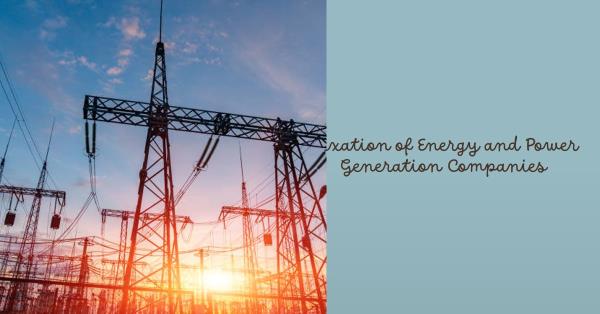Taxation of energy and power generation companies in Pakistan is a crucial topic, as the energy sector plays a vital role in the country’s economy. The tax system in Pakistan is complex, and companies are subject to various types of taxes. In this article, we will provide an overview of the different types of taxes that energy and power generation companies in Pakistan are subject to, along with examples and case studies.
Income Tax
Income tax is a tax on a company’s profits. Energy and power generation companies in Pakistan are subject to income tax at a rate of 29% for the tax year 2022. However, companies in the renewable energy sector enjoy tax exemptions, which vary according to the type of project and location.
For example, in 2021, the government of Pakistan announced tax exemptions for renewable energy projects, including solar, wind, and hydropower projects. The exemption includes a 10-year exemption from income tax, along with a 10-year exemption from the minimum tax on turnover.
Sales Tax
Sales tax is a tax on the sale of goods and services. In Pakistan, the standard rate of sales tax is 17%. However, certain goods and services are exempt from sales tax, such as renewable energy equipment.
Energy and power generation companies in Pakistan are required to register for sales tax and collect sales tax on their sales. However, companies in the renewable energy sector enjoy sales tax exemptions, which vary according to the type of project and location.
For example, in 2021, the government of Pakistan announced sales tax exemptions for renewable energy projects. The exemption includes a sales tax exemption on the import of machinery and equipment for renewable energy projects.
Custom Duty
Custom duty is a tax on imported goods. In Pakistan, custom duty rates vary depending on the type of goods being imported. Energy and power generation companies in Pakistan are subject to custom duty on the import of machinery and equipment.
For example, in 2021, the government of Pakistan announced custom duty exemptions for renewable energy projects. The exemption includes a custom duty exemption on the import of machinery and equipment for renewable energy projects.
Withholding Tax
Withholding tax is a tax on payments made to non-residents. Energy and power generation companies in Pakistan are subject to withholding tax on payments made to non-residents, such as dividends and interest.
For example, in 2021, the government of Pakistan announced withholding tax exemptions for renewable energy projects. The exemption includes a withholding tax exemption on interest payments made to non-residents for renewable energy projects.
Case Studies:
The Neelum Jhelum Hydropower Project
The Neelum Jhelum Hydropower Project is a 969 MW hydroelectric power project located in Azad Jammu and Kashmir, Pakistan. The project was completed in 2018 and is owned by the Water and Power Development Authority (WAPDA).
The Neelum Jhelum Hydropower Project enjoyed tax exemptions during its construction phase. The exemptions included an income tax exemption for ten years and a sales tax exemption on the import of machinery and equipment.
The Quaid-e-Azam Solar Park
The Quaid-e-Azam Solar Park is a 1,000 MW solar power project located in Bahawalpur, Pakistan. The project was completed in 2019 and is owned by the Punjab Energy Department.
The Quaid-e-Azam Solar Park enjoyed tax exemptions during its construction phase. The exemptions included an income tax exemption for ten years and a sales tax exemption on the import of machinery and equipment.
Conclusion:
In conclusion, energy and power generation companies in Pakistan are subject to various types of taxes, including income tax, sales tax, custom duty, and withholding tax. However, the government of Pakistan has introduced tax exemptions and incentives for companies operating in the renewable energy sector. These exemptions and incentives aim to promote the development of renewable energy projects and reduce the country’s dependence on fossil fuels.
It is important for energy and power generation companies to understand the tax system in Pakistan and comply with the tax regulations. Failure to do so can result in penalties and legal issues.
Furthermore, tax exemptions and incentives for renewable energy projects can be a significant factor in attracting foreign investment in the energy sector. Therefore, the government should continue to provide incentives for renewable energy projects to attract more investment and promote sustainable development.
In conclusion, the taxation of energy and power generation companies in Pakistan is a complex topic, with various types of taxes and exemptions. The government of Pakistan should continue to provide incentives for renewable energy projects to promote sustainable development and attract more investment in the energy sector.
